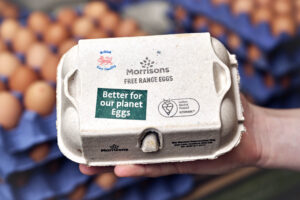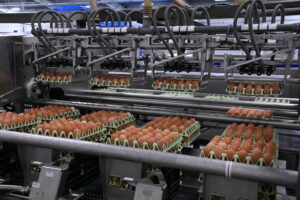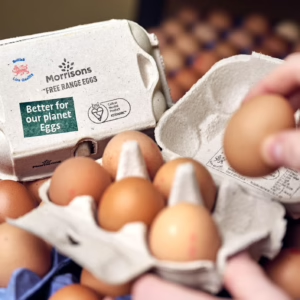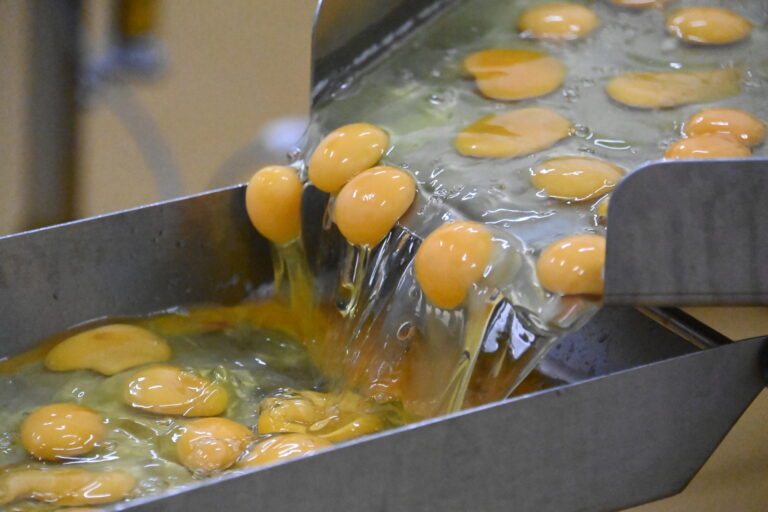Chippindale Foods is leading the market with its award-winning carbon-neutral egg. Michael Barker hears how it was achieved
In an era when the word ‘innovation’ tends to conjure up images of robots and artificial intelligence, it’s refreshing to see the humble egg take centre stage once again.
Chippindale Foods won the Innovation of the Year category at the National Egg & Poultry Awards this summer, not for a fancy new machine, but for producing something essential to the future of the planet – a bona fide carbon-neutral egg.

The North Yorkshire-based company started life back in 1930 as a mixed family farm, but has really hit its straps since opening a new £5 million purpose-built, 55-000 sq ft low-carbon egg facility in 2013. The pace of production picked up even further after it was acquired by Morrisons Manufacturing, now known as Myton Food Group, in 2018. Since then it has expanded its facilities, more than doubled its output, added a second grader, and built a liquid egg plant. Chippindale now supplies around 13m free-range eggs a week to its customers, while also producing 60 tonnes of liquid egg a week for quiches in Myton’s chilled foods site and selling to Myton’s sizeable external customer base.
Impressive though those achievements are, it’s the work the business has done to produce its ‘Better for our Planet’ brand of eggs that has really captured the imagination and won Chippindale the Innovation of the Year Award. It ties into both the company’s and Morrisons’ longer-term sustainability targets, and puts it at the forefront of wider industry efforts to reduce the carbon footprint of British farming.
The origins of the company’s progress towards net-zero, explains Chippindale’s account specialist for eggs, Molly Airstone, goes back to the very fabric of Morrisons’ ethos. “We have always been very proud to be British farming’s biggest customer,” she says. “We’ve always had that really close connection with producers across all livestock categories and started carbon footprinting farms very early on compared to some of our competitors.”

At the centre of the work is Chippindale producer Hugh Carter, whose farm was a natural choice to be the first trial site for the brand as he already ran an impressive number of renewable energy projects, in addition to soil sampling and carbon sequestration. He had also spent considerable time developing a soy-free feed with the support of Chippindale, which is a critical part of lowering the carbon footprint of egg production. “It’s entirely soy-free after the pullet stage,” Airstone explains, “so the birds get soy when they’re being reared, but from the time they are housed it’s completely soy-free. It was a lot of effort to ensure they had the right protein and amino acid balance, and a fantastic effort from Hugh, who home grows, mills and mixes all his own feed. It’s a very circular process.”
Getting that formulation right is a delicate undertaking. While there may be plenty of protein alternatives, few have the same amino acid and nutritional profile as soy. The end-to-end process to get the product on shelf was almost two years.
The development of the carbon-neutral eggs was a coup for both Chippindale and Morrisons, for a number of reasons. Working with the British Standards Institution (BSI), the eggs this year became the first product in the country to earn the exacting carbon-neutral kitemark – and remarkably, it is still the only product to have done so. When it relaunched in Morrisons in March, it set Morrisons apart as the first UK retailer to have a BSI-certified carbon-neutral product on offer to consumers.
Given the rarity of the milestone, it’s not surprising it was a difficult marque to attain and involved putting in the hard yards. Airstone says the BSI’s process involves a detailed level of auditing, with analysis of how all the figures have been calculated. It ensures every part of the company’s calculations and process is reviewed end to end in line with ISO 140067 and PAS2060.
Morrisons has an ambition to reach net zero in its agriculture supply chain by 2030, and steps such as the launch of Better for Our Planet Eggs go a long way in supporting that journey. Airstone believes that sharing learnings and seeing how they apply to different farms and systems is how sustainable, long-term impacts are made. “We’ve got a really progressive producer group that are very keen to be involved in our projects,” she stresses. “We’ve gone out and proved it can be done. Now it’s about how we share that knowledge further and bring more producers on the same journey as we know there is more than one way to get to net zero.
Airstone admits that consumers are still in the early days of seeking out climate-friendly products, and that so far the brand remains somewhat niche. At this stage there is an extra cost that comes with the Better for our Planet eggs to support the additional costs required to reach the standard, and with current economic challenges it is not every consumer’s first priority. However, the direction of travel is clear and the commitment to the process is admirable.
Morrisons is determined to help educate consumers on the benefits of the brand, and has given it a dedicated stand in store, complete with an information board to help tell the Better for our Planet story. Having the BSI kitemark on packs adds that extra layer of credibility that the brand can be trusted, in an era where carbon claims remain a relatively new and less understood phenomenon.
Morrisons points out that Better for our Planet eggs – which initially launched into 115 stores in the south of England, achieve a 60% carbon reduction compared to the standard egg range in their first year. It also helps the supermarket chain towards its own goal of reducing its scope 3 emissions by 30% by 2030, an objective that aims to include net-zero agriculture emissions from its direct UK supply chain.

Despite the many challenges facing the industry, from cost pressure to avian flu, Chippindale hasn’t held back from pushing ahead with its work. Airstone believes this is a “complex but pivotal” time for the egg sector as suppliers and retailers look to meet their cage-free commitments, she says. “It’ll definitely be an interesting six or 12 months.”
For Chippindale, one of the great pleasures in winning the award was the chance to give Hugh Carter the limelight for driving forward production of the carbon-neutral egg. “It’s a lovely thing for us to be able to give back to and recognise producers for all their hard work,” she says. “In my eyes they’re the ones that are really going to move this forward. We’re really appreciative of how involved and how up for the challenge they are, and wanting to work with us.” Even though that journey is well underway and significant milestones have been hit, one senses there are still many more successes to come.
Morrisons backs British farmers
Morrisons has revealed it is investing over £1.4bn a year in British farming as it “continues to stand shoulder to shoulder with UK farmers”.
Speaking on 1 November, the supermarket said that as British farming’s single biggest direct customer, it was bringing forward support planned for December, by offering a five per cent discount for farmers to use in its stores and online.
The gesture of appreciation extends to all Morrisons direct egg suppliers, as well as livestock suppliers who provide lamb, beef and pork; direct fruit and veg growers; and dairy farmers with a Morrisons contract.
The 5% discount for farmers expands Morrisons package of business support for UK farming, which already includes long-term contracts and cash-flow programmes.
Rami Baitiéh, Morrisons chief executive, said: “Now and always we stand shoulder to shoulder with British farmers – some of the unsung heroes of our society, growing and providing home-grown food, which we all benefit from every day. As British farming’s single biggest direct customer and in light of the recent Budget, our £1.4bn investment in UK farming demonstrates our core commitment to long-term relationships through contracts, cashflow schemes and practical industry support.”
Morrisons’ ‘For Farmers’ range, which includes eggs, milk, cheese and cream, also enables customers to give back directly to food producers and has raised over £25m to date. As more customers choose to show their support for British farmers, additional products are set to be considered for the range in the coming months.
Earlier this year Morrisons announced a Farmers’ Council, which will meet with Morrisons’ CEO and board twice yearly to discuss the retailer’s role in working with British farmers to deliver long-term and sustainable farming partnerships. The next meeting will take place in December, hosted at Morrisons head office ahead of the busy Christmas period.


